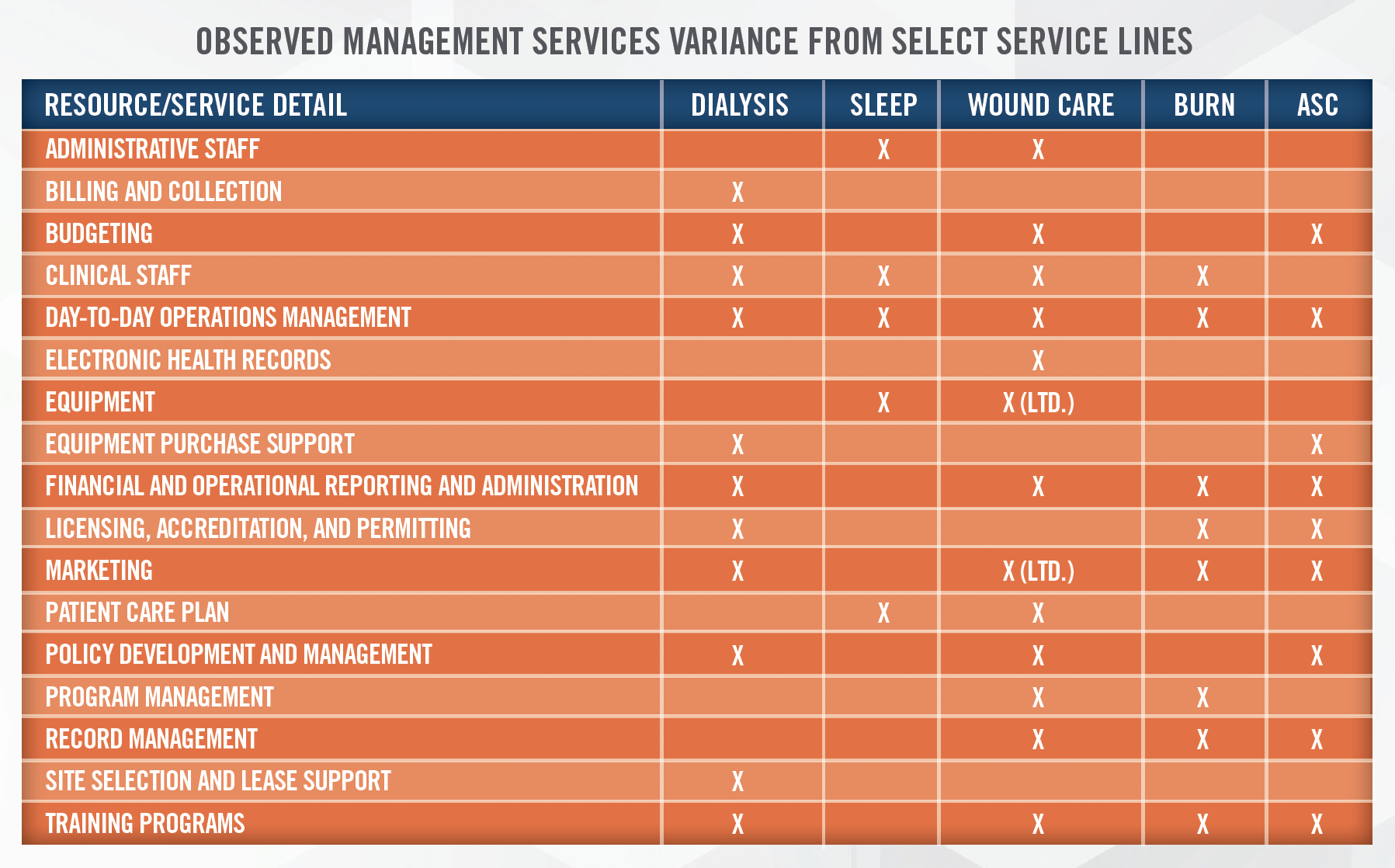Authors: William G. Kaufmann, JD/MBA, David Sands, ASA and Fred Lara, CFA, ASA, CVA

In forming and evaluating management agreements, hospital operators and counsels alike can have varying expectations as to the nature, structure and value of these arrangements. In many instances, this variance is dictated by reliance on the term “management agreement” in one specialty area to be reflective of its meaning in another. This article reviews and describes management agreement structures in a sampling of services lines, detailing the key differences that might influence value.
Healthcare facilities commonly engage management services organizations (“Manager(s)”) to provide an assortment of duties and responsibilities relating to the management of individual service lines. Through their specialization and service line experience, Managers are able to bring to bear a high degree of administrative ability and technical expertise within a particular area. Successful Managers provide demonstrable improvements in quality, efficiency, and effectiveness of a particular specific service.
The array of services provided by a Manager can include, but are not limited to, day-to-day operations tasks, clinical and administrative staffing, medical directors, general operations responsibilities, and provision of equipment and/or software. Given the variety of service lines that may require management services, as well as the specific assortment of services that may be required, management arrangements often include custom tailored compensation mechanisms. Examples include fixed payment, variable/volume-based payment, percent of revenue, cost-sharing, cost plus, and other combinations thereof. Payment mechanisms may further be influenced by quality and performance outcomes. Depending on the jurisdiction, corporate practice of medicine laws may prohibit certain of these compensation structures.
The term management agreement is applied to many relationships, and carries different connotations depending on the letter of the agreement. To better illustrate the variety we observe, we reviewed typical structures in a sample of management agreements addressing the following service types: dialysis centers, sleep centers, wound care/hyperbaric centers, burn centers, and ambulatory surgery centers (“ASC”).[1] In evaluating the fair market value (“FMV”) of management agreements, HealthCare Appraisers generally classifies the related elements/tasks in into one of following ten categories:
![]() Human Resources and Staffing (e.g., hiring, evaluation, scheduling, benefits, etc.)
Human Resources and Staffing (e.g., hiring, evaluation, scheduling, benefits, etc.)![]()
![]()
![]()
![]()
![]()
![]()
![]()
![]()
![]()
![]()
![]()
![]()
![]()
![]()
![]()
![]()
![]()
![]()
![]()
![]()
![]()
![]()
![]()
![]()
![]()
![]()
![]()
![]()
![]()
![]()
![]()
![]()
![]()
![]()
![]()
![]()
![]()
![]()
![]()
![]()
![]()
![]()
![]()
![]()
![]()
![]()
![]()
![]()
![]()
![]()
![]()
![]()
![]()
![]()
![]()
![]()
![]()
![]()
![]()
![]()
![]()
![]()
![]()
![]()
![]()
![]()
![]()
![]()
![]()
![]()
![]()
![]()
![]()
![]()
![]()
![]()
![]()
![]()
![]()
![]()
![]()
![]()
![]()
![]()
![]()
![]()
![]()
![]()
![]()
![]()
![]()
![]()
![]()
![]()
![]()
![]()
![]()
![]()
![]()
Certain tasks carry more or less FMV significance depending on the overall size of the program or service line (e.g., annual net revenue, program volume, etc.), clinical staffing requirements[2] (e.g., quantity of full-time equivalents, provider/staff mix, medical director oversight, etc.), or time dedicated to the management of the program. A comparison of the components typically seen in different service line management arrangements is shown below in the table below.


To assess the FMV of a given arrangement, HealthCare Appraisers applies valuation approaches adapted to the unique needs of each agreement. We may employ a cost approach to “build up” the hypothetical cost to an operator based on the principle of substitution and/or a market approach leveraging our proprietary scoring algorithm, applied to internally produced industry-leading ASC survey data on management fees or other relevant benchmark information. In effect, we modify and apply these broad valuation approaches to adjust for each specific component of a management arrangement.
Given the variety and combinations of service elements, along with the specific needs of a program, it is highly unlikely to find identical or even substantially comparable management arrangements. As such, broad reliance upon implied management services fees as a percentage of revenue to evaluate the FMV of a given management agreement may overlook or overstate the value of certain key resources. Therefore, we encourage our clients to carefully consider the implications of each management services element during contract negotiations and drafting. HealthCare Appraisers leverages our experience and expertise with management agreements to provide our clients with reliable FMV guidance.
[1] We note that variances also occur in other service line management arrangements, such as physical therapy, surgery, orthopedics, oncology, obstetrics and gynecology, neurology, and cardiovascular/thoracic service lines, physician practice, and whole hospital.
[2] An area worthy of scrutiny are management arrangements which include or are associated with separate compensation for clinical staff in addition to compensation for traditional management services, wherein the duties provided by the clinical staff may overlap with the broader management services, creating the potential for overlapping compensation.
